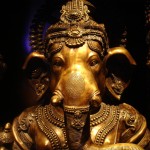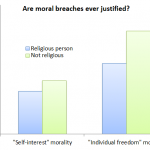Editor’s Note: This article is part of the Patheos Public Square on the Future of Faith in America: Humanism. Read other perspectives here.

When it comes to religion, the USA is an oddball. The populations of most wealthy nations underwent a massive loss of religion over the course of the 20th century. But, for some reason, that never happened in the USA.
Why? Well, social scientists in the US, such as Peter Berger, have trumpeted the values of a free market. They claim that competition between churches in the USA means that they are better suited to people’s needs – unlike the fusty old ‘state’ churches of Europe.
European social scientists counter that the US market isn’t really all that freewheeling, given the market share of Christianity. Back in 2002, the Scottish sociologist Steve Bruce argued, in his book God is Dead, that secularization is inevitable in modern societies and that it would, in time, come to the US too.
The latest Pew Religion survey, conducted in 2014 and released in May, suggests that the Europeans may have been right after all.
Since 2007, the religious ‘nones’ (those who describe themselves as atheist, agnostic or “nothing in particular”) have leapt in number by over 50% – an extra 19 million nonreligious Americans in 7 years. They now comprise some 23% of the population.
The Pew Survey is not alone. It comes on the back of a raft of similar surveys in recent years – even back in 2009, it was clear that there had been an upturn in the numbers of non-believers in the USA (although based on surveys far smaller than the Pew Survey). Earlier this year, an analysis of data from the ‘Monitoring the Future’ program showed how non-belief has risen dramatically among 8th, 10th and 12th graders.
Many of the non-religious in the Pew Survey are not diehard nonbelievers. You might think that, with a little effort, religious organisations could bring these folks back into the fold. But in fact this ‘fuzzy middle‘ is quite typical for the USA and is even larger in non-religious countries like the UK. What happens when a country loses religion is not that everyone become an atheist, but rather that most people, especially the less educated, simply stop caring.
So why the recent dramatic increase in the non-religious? Well,
But there are other things going on too. The advent of the internet appears to be a major factor, probably because it has broadened people’s outlook and awareness of alternative world views. Increasing numbers of university graduates, especially those studying humanities, has also contributed.
The increase is largest among the young. This matches what has happened in the past in other countries, and statistical analysis of data from the USA shows that we are seeing a snowball effect as loss of religion cascades through generations. The secularisation we have seen so far is merely a taste of what is to come.
For those who consider religion to be the basis of moral society, these numbers look alarming. However, evidence from countries that have already largely secularised suggest that the opposite is the case.
For example, recent data show that countries with the least religion are also the most socially advanced. Nor do communities break down – there is no relationship between how religious a country is and a rich it is in social capital.
Now, I would hesitate to say that loss of religion causes countries to be better places to live. It may be the other way around. But it’s at least plausible that once people stop relying on their God to dispense justice, and instead look to other people, that the result will be a more open, more tolerant, and more just society. Time will tell!















